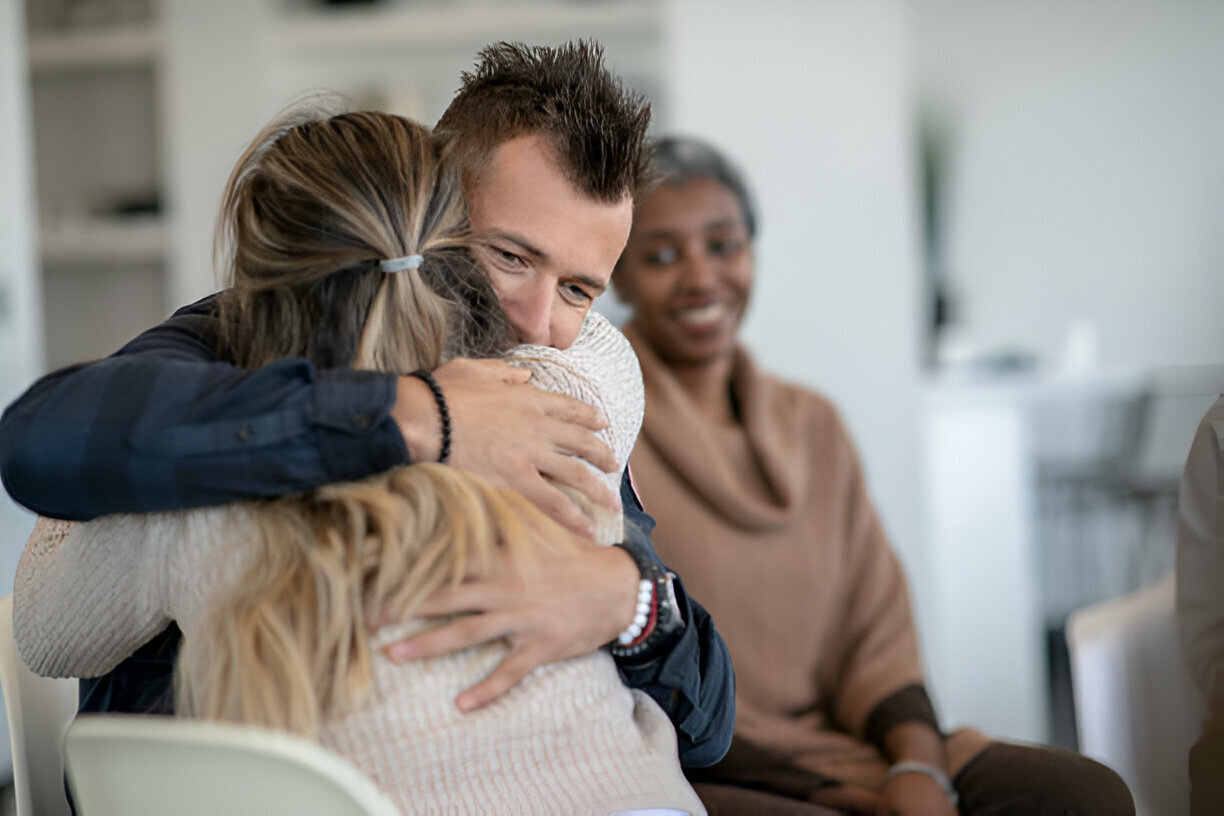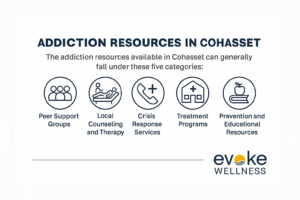When you’ve tried everything—from early conversations and outpatient counseling to hoping it was “just a phase”—and nothing seems to change, the word “resource” can start to feel hollow.
But even when you’re exhausted, addiction resources in Cohasset can still serve a vital role—if you understand what they can actually do, and when to turn to something more intensive.
This blog is for families who are hanging by a thread. For parents, siblings, or partners trying to stay connected to someone they love while navigating chaos, fear, or emotional distance. At Evoke Wellness at Cohasset, we talk with families like yours every day. And we want you to have a clear map.
Types of Addiction Resources in Cohasset
In a town like Cohasset, the addiction resources available to you will generally fall into five categories. Understanding which is which can reduce the emotional whiplash of trying things that weren’t built to do what you needed in the first place.
1. Peer Support Groups
These include Alcoholics Anonymous (AA), Narcotics Anonymous (NA), SMART Recovery, and Al-Anon for family members. They’re usually free, community-led, and focused on shared experience and accountability.
2. Local Counseling and Therapy
These can be private practices, group practices, or community mental health centers offering individual or family therapy. Some therapists specialize in substance use; others focus on trauma, family dynamics, or grief.
3. Crisis Response Services
South Shore or regional hotlines may connect you with behavioral health teams who can assess a situation and offer in-the-moment guidance. These services are often accessed through hospital systems or emergency lines.
4. Treatment Programs
Structured programs like those at Evoke Wellness at Cohasset offer different levels of care—from detox and residential to intensive outpatient (IOP) and aftercare. These programs are designed for people ready (or almost ready) to engage in change.
5. Prevention and Educational Resources
Schools, youth programs, and nonprofits may offer education about substance use, mental health, and prevention—especially targeted at teens and young adults.
Each resource matters. But they don’t all carry the same weight when it comes to impact—and they’re not interchangeable.
What These Resources Can Do
Addiction recovery isn’t one-size-fits-all. Many people need different kinds of support at different points. Here’s what the available resources in Cohasset can offer when used appropriately:
- Validation and connection – Peer-led groups normalize feelings of isolation and shame, which are common for both users and loved ones.
- Ongoing accountability – Weekly or daily meetings provide structure and gentle reinforcement.
- Emotional processing – Family therapy or individual counseling can help unravel years of patterns, resentment, or pain.
- In-the-moment triage – Crisis lines can help during moments of escalation—when someone is suicidal, intoxicated, or missing.
- Bridges to deeper care – Many people enter treatment not from rock bottom, but because someone else connected them with a higher level of support.
Sometimes, these lower-intensity resources are enough to shift the momentum. But when they’re not, it’s not a sign of failure. It just means more scaffolding is needed.
What These Resources Can’t Do
One of the biggest emotional pitfalls for families is investing hope into a resource that wasn’t designed to solve the level of problem you’re facing.
Here’s what to be realistic about:
- Support groups won’t stop active use. They’re voluntary and often only helpful if the person wants to be there.
- Outpatient therapy can’t manage crisis-level addiction. A weekly session can be life-changing for maintenance, but it’s not designed for detox, withdrawal, or dangerous behaviors.
- Crisis teams aren’t a full solution. They can offer triage and safety planning—but unless connected to ongoing care, the support may be short-lived.
It’s okay to outgrow these tools. Sometimes you need a hammer; other times you need scaffolding, a safety net, or a full team.
When It’s Time to Escalate to Structured Treatment
Deciding when it’s time to transition from community support to professional treatment is one of the hardest decisions a family can make. There’s often guilt, fear of overreacting, or hope that one more group meeting or therapist visit will tip the scales.
Here are some signs it’s time to look at structured treatment like what we offer at Evoke:
- Repeated cycles of use and short-term stops with no lasting change
- Deterioration in health, work, or family relationships
- Lying, stealing, or disappearing for periods of time
- No response to outpatient therapy or informal support
- Your gut is telling you this is bigger than what you can manage
You are not weak for needing backup. You are wise for recognizing when the situation calls for a different tool.
How to Take the First Step—Even If They’re Not Ready
The idea that someone has to “hit bottom” before getting help is outdated. Intervention, education, and family involvement can create a turning point before things get worse.
Here’s how to begin:
- Call a treatment center just for information. You don’t have to commit or even tell your loved one yet.
- Ask about options that fit your level of urgency. Programs often have flexible levels of care that meet people where they are.
- Set one clear boundary or action step. It might be refusing to fund a habit or asking them to attend an assessment.
You can’t control someone else’s recovery. But you can control how you support it—and how you protect your own peace in the process.
FAQs About Addiction Resources in Cohasset
Are there free addiction resources in Cohasset?
Yes. Peer support groups like AA, NA, and Al-Anon are free. Some community mental health centers may also offer sliding scale or insurance-based services.
What if my loved one refuses help?
This is common. You can still call a center like Evoke to get guidance and build a plan. Many families plant seeds months before someone agrees to enter treatment.
Is there a waitlist for treatment?
It depends. Some programs have immediate openings, especially for outpatient care. Calling sooner increases the chance of a smoother intake process.
Can I attend therapy or support groups even if my loved one won’t?
Absolutely. Family support is a crucial piece of recovery. Groups like Al-Anon or working with a family therapist can help you cope and set healthy boundaries.
Does Evoke Wellness at Cohasset accept insurance?
Yes, many major plans are accepted. Our admissions team can verify your benefits quickly and walk you through what’s covered.
You Don’t Have to Navigate This Alone
Whether you’re ready to explore treatment or simply need to talk it through, we’re here. Call Evoke Wellness at Cohasset at (866) 931-6429 or visit our page on addiction resources in Cohasset to take the first step.





